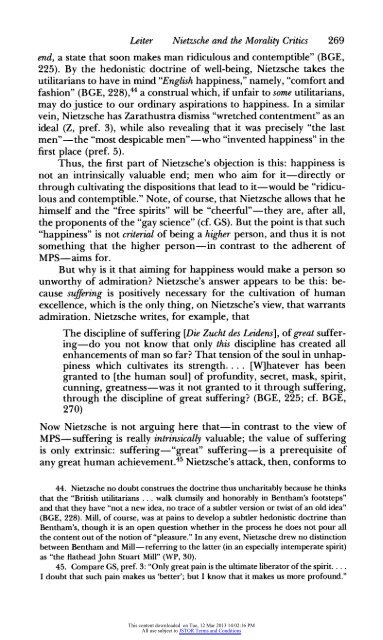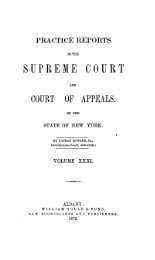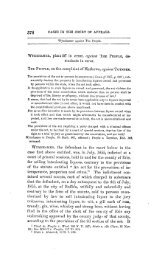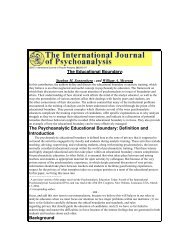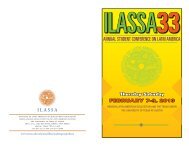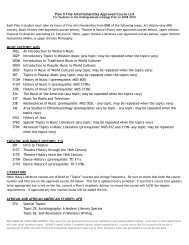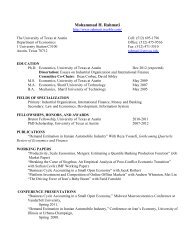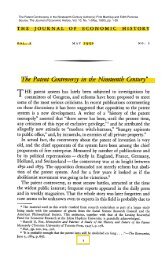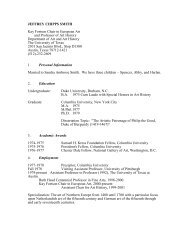Nietzsche and the Morality Critics - The University of Texas at Austin
Nietzsche and the Morality Critics - The University of Texas at Austin
Nietzsche and the Morality Critics - The University of Texas at Austin
You also want an ePaper? Increase the reach of your titles
YUMPU automatically turns print PDFs into web optimized ePapers that Google loves.
Leiter <strong>Nietzsche</strong> <strong>and</strong> <strong>the</strong> <strong>Morality</strong> <strong>Critics</strong> 269end, a st<strong>at</strong>e th<strong>at</strong> soon makes man ridiculous <strong>and</strong> contemptible" (BGE,225). By <strong>the</strong> hedonistic doctrine <strong>of</strong> well-being, <strong>Nietzsche</strong> takes <strong>the</strong>utilitarians to have in mind "English happiness," namely, "comfort <strong>and</strong>fashion" (BGE, 228),44 a construal which, if unfair to some utilitarians,may do justice to our ordinary aspir<strong>at</strong>ions to happiness. In a similarvein, <strong>Nietzsche</strong> has Zar<strong>at</strong>hustra dismiss "wretched contentment" as anideal (Z, pref. 3), while also revealing th<strong>at</strong> it was precisely "<strong>the</strong> lastmen"-<strong>the</strong> "most despicable men"-who "invented happiness" in <strong>the</strong>first place (pref. 5).Thus, <strong>the</strong> first part <strong>of</strong> <strong>Nietzsche</strong>'s objection is this: happiness isnot an intrinsically valuable end; men who aim for it-directly orthrough cultiv<strong>at</strong>ing <strong>the</strong> dispositions th<strong>at</strong> lead to it-would be "ridiculous<strong>and</strong> contemptible." Note, <strong>of</strong> course, th<strong>at</strong> <strong>Nietzsche</strong> allows th<strong>at</strong> hehimself <strong>and</strong> <strong>the</strong> "free spirits" will be "cheerful"-<strong>the</strong>y are, after all,<strong>the</strong> proponents <strong>of</strong> <strong>the</strong> "gay science" (cf. GS). But <strong>the</strong> point is th<strong>at</strong> such"happiness" is not criterial <strong>of</strong> being a higher person, <strong>and</strong> thus it is notsomething th<strong>at</strong> <strong>the</strong> higher person-in contrast to <strong>the</strong> adherent <strong>of</strong>MPS-aims for.But why is it th<strong>at</strong> aiming for happiness would make a person sounworthy <strong>of</strong> admir<strong>at</strong>ion? <strong>Nietzsche</strong>'s answer appears to be this: becausesuffering is positively necessary for <strong>the</strong> cultiv<strong>at</strong>ion <strong>of</strong> humanexcellence, which is <strong>the</strong> only thing, on <strong>Nietzsche</strong>'s view, th<strong>at</strong> warrantsadmir<strong>at</strong>ion. <strong>Nietzsche</strong> writes, for example, th<strong>at</strong><strong>The</strong> discipline <strong>of</strong> suffering [Die Zucht des Leidens], <strong>of</strong> gre<strong>at</strong> suffering-doyou not know th<strong>at</strong> only this discipline has cre<strong>at</strong>ed allenhancements <strong>of</strong> man so far? Th<strong>at</strong> tension <strong>of</strong> <strong>the</strong> soul in unhappinesswhich cultiv<strong>at</strong>es its strength.... [W]h<strong>at</strong>ever has beengranted to [<strong>the</strong> human soul] <strong>of</strong> pr<strong>of</strong>undity, secret, mask, spirit,cunning, gre<strong>at</strong>ness-was it not granted to it through suffering,through <strong>the</strong> discipline <strong>of</strong> gre<strong>at</strong> suffering? (BGE, 225; cf. BGE,270)Now <strong>Nietzsche</strong> is not arguing here th<strong>at</strong>-in contrast to <strong>the</strong> view <strong>of</strong>MPS-suffering is really intrinsically valuable; <strong>the</strong> value <strong>of</strong> sufferingis only extrinsic: suffering-"gre<strong>at</strong>"9 suffering-is a prerequisite <strong>of</strong>any gre<strong>at</strong> human achievement.45 <strong>Nietzsche</strong>'s <strong>at</strong>tack, <strong>the</strong>n, conforms to44. <strong>Nietzsche</strong> no doubt construes <strong>the</strong> doctrine thus uncharitably because he thinksth<strong>at</strong> <strong>the</strong> "British utilitarians ... walk clumsily <strong>and</strong> honorably in Bentham's footsteps"<strong>and</strong> th<strong>at</strong> <strong>the</strong>y have "not a new idea, no trace <strong>of</strong> a subtler version or twist <strong>of</strong> an old idea"(BGE, 228). Mill, <strong>of</strong> course, was <strong>at</strong> pains to develop a subtler hedonistic doctrine thanBentham's, though it is an open question whe<strong>the</strong>r in <strong>the</strong> process he does not pour all<strong>the</strong> content out <strong>of</strong> <strong>the</strong> notion <strong>of</strong> "pleasure." In any event, <strong>Nietzsche</strong> drew no distinctionbetween Bentham <strong>and</strong> Mill-referring to <strong>the</strong> l<strong>at</strong>ter (in an especially intemper<strong>at</strong>e spirit)as "<strong>the</strong> fla<strong>the</strong>ad John Stuart Mill" (WP, 30).45. Compare GS, pref. 3: "Only gre<strong>at</strong> pain is <strong>the</strong> ultim<strong>at</strong>e liber<strong>at</strong>or <strong>of</strong> <strong>the</strong> spirit....I doubt th<strong>at</strong> such pain makes us 'better'; but I know th<strong>at</strong> it makes us more pr<strong>of</strong>ound."This content downloaded on Tue, 12 Mar 2013 14:02:16 PMAll use subject to JSTOR Terms <strong>and</strong> Conditions


